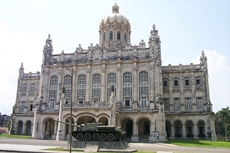US, Cuba restart diplomatic engagement after more than a decade
20 Jul 2015
The United States and Cuba have restarted diplomatic engagements and reopened their embassies at Havana and Washington on Monday, for the first time since severing ties in 1961, ending 54 years of diplomatic estrangement between the two neighbours.
 The reopening of the Cuban embassy in Washington comes more than seven months after US President Barack Obama declared the end of hostilities with Cuba and normalisation of bilateral relations.
The reopening of the Cuban embassy in Washington comes more than seven months after US President Barack Obama declared the end of hostilities with Cuba and normalisation of bilateral relations.
Reports quoting diplomatic sources said some 500 guests, including officials, members of Congress, businessmen, think tanks experts, executives of non-government organisations have been invited to the opening ceremony of Havan's mission in Washington.
Cuban foreign minister Bruno Rodriguez Parrilla also was to travel to the US to attend the function at the embassy in Washington to raise his country's flag, an event that Cuban government officials said would be broadcast live on the island's state-run TV.
The US will officially restart diplomatic engagement with Cuba after foreign secretary John Kerr's visit to Havana for the flag-hoisting ceremony in August.
Kerry's visit will also be the highest-level trip by a US official to Cuba since the 1959 revolution.
Starting today, US officials said, the Cuban government will pull back some of the tight cordon of security that had surrounded America's diplomatic mission in Havana and no longer record the names of Cubans entering the building.
The Cuban and American heads of their respective sections will became charges d'affaires until ambassadors are named.
"A new stage will begin, long and complex, on the road toward normalisation," Cuban President Raul Castro said in a televised address last week to the Cuban people, "which will require the will to find solutions to the problems that have accumulated over more than five decades and hurt ties between our nations and peoples."
Washington and Havana snapped diplomatic ties in 1961 when Cuban leader Fidel Castro threatened to expel American diplomats for meddling in Cuban affairs after seizing diplomatic property.
Fidel Castro called the section "a nest of spies" and led frequent marches with hundreds of thousands of supporters to protest US policies.
The summary executions of officials from the US-backed Fulgencio Batista regime that Castro had overthrown further ruptured bilateral ties.
The United States cut off all diplomatic ties with Cuba. "There is a limit to what the United States in self-respect can endure. That limit has now been reached," President Dwight D Eisenhower said.
Swiss diplomats took over the maintenance of the seaside former US Embassy and the sprawling ambassador's residence in Havana.
The failed US-backed invasion at the Bay of Pigs, Fidel Castro's declaration that his revolution was socialist, repeated CIA plots to assassinate Castro, and the Cuban Missile crisis further poisoned affairs for the decades that followed.
But in 1977, the administration of President Jimmy carter tried to improve relations with Cuba and the two countries had opened interests sections in their former embassies.
This allowed the Cold War foes to have diplomatic dealings without officially restoring relations.
The reopening of its Cuba mission is another historic achievement of President Barack Obama coming along with the nuclear deal with Iran.



















